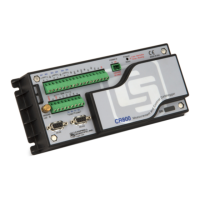Section 11. Glossary
Term: sample rate
The rate at which measurements are made by the CR800. The measurement
sample rate is of interest when considering the effect of time skew, or how
close in time are a series of measurements, or how close a time stamp on a
measurement is to the true time the phenomenon being measured occurred.
A 'maximum sample rate' is the rate at which a measurement can repeatedly
be made by a single CRBasic instruction.
Sample rate is how often an instrument reports a result at its output;
frequency response is how well an instrument responds to fast fluctuations on
its input. By way of example, sampling a large gage thermocouple at 1 kHz
will give a high sample rate but does not ensure the measurement has a high
frequency response. A fine-wire thermocouple, which changes output quickly
with changes in temperature, is more likely to have a high frequency
response.
Term: scan interval
The time interval between initiating each execution of a given Scan() of a
CRBasic program. If the Scan() Interval is evenly divisible into 24 hours
(86,400 seconds), it is synchronized with the 24 hour clock, so that the
program is executed at midnight and every Scan() Interval thereafter. The
program is executed for the first time at the first occurrence of the Scan()
Interval after compilation. If the Scan() Interval does not divide evenly into
24 hours, execution will start on the first even second after compilation.
Term: scan time
When time functions are run inside the Scan() / NextScan construct, time
stamps are based on when the scan was started according to the CR800 clock.
Resolution of scan time is equal to the length of the scan. See system time
(p.
517).
Term: SDI-12
Serial Data Interface at 1200 baud. Communication protocol for transferring
data between the CR800 and SDI-12 compatible smart sensors.
Term: SDM
Synchronous Device for Measurement. A processor-based peripheral device
or sensor that communicates with the CR800 via hardwire over a short
distance using a protocol proprietary to Campbell Scientific.
Term: Seebeck effect
Induces microvolt level thermal electromotive forces (EMF) across junctions
of dissimilar metals in the presence of temperature gradients. This is the

